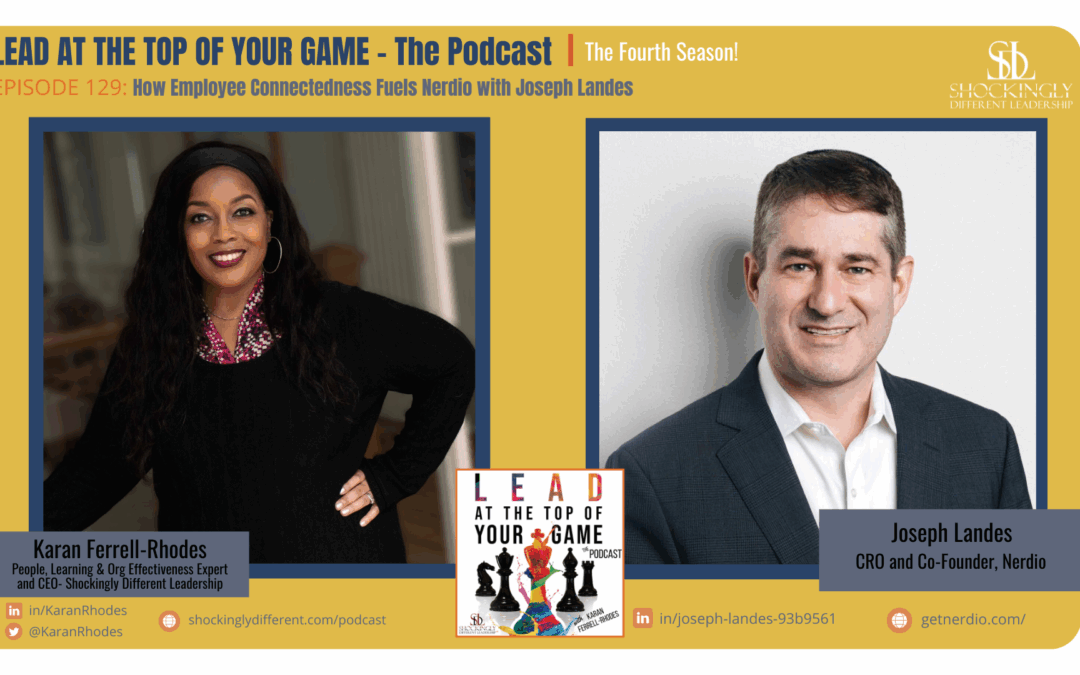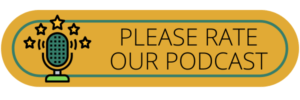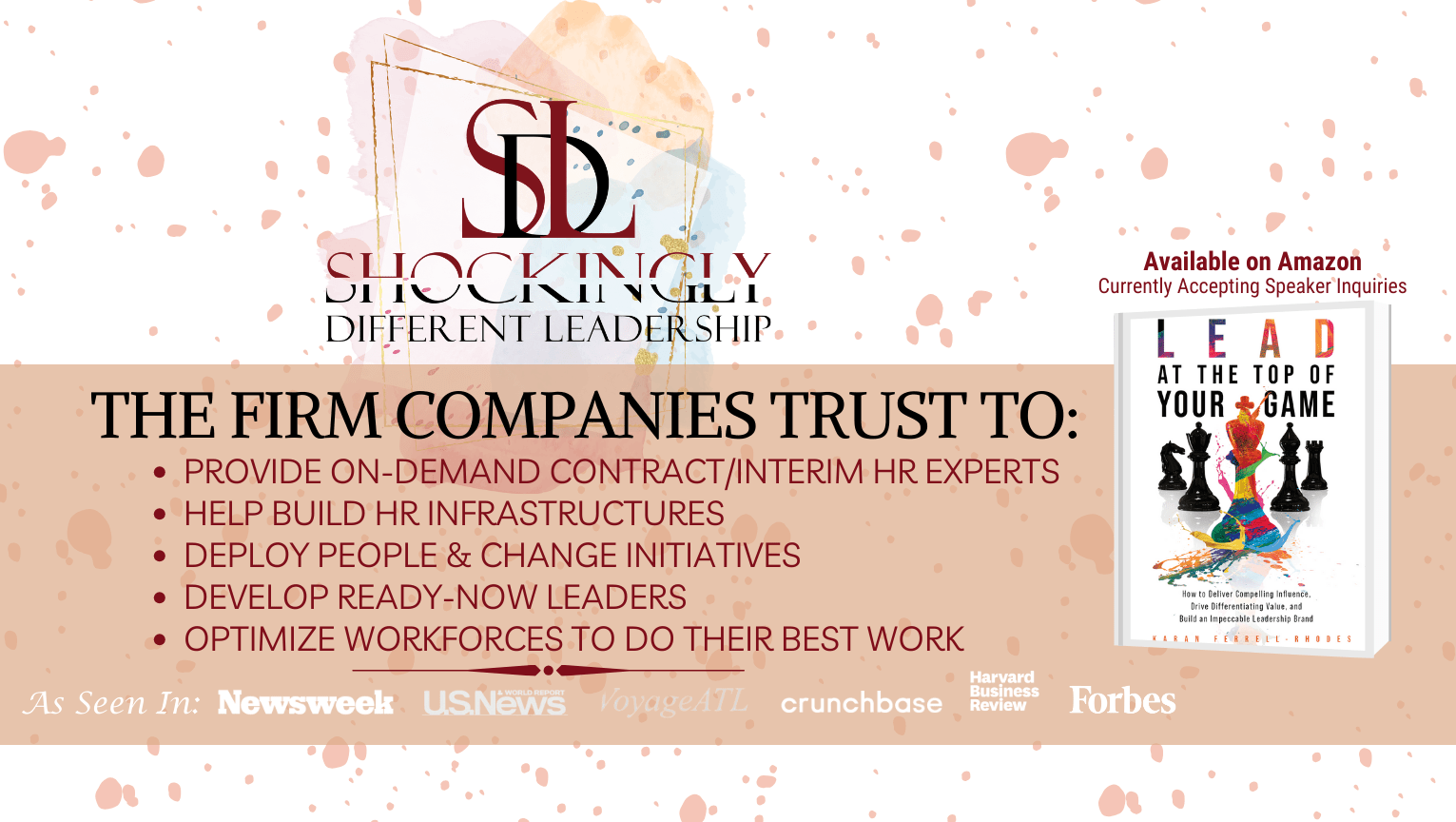IN THIS EPISODE, KARAN FERRELL-RHODES INTERVIEWS JOSEPH LANDES.
Joseph discusses transitioning from Microsoft to leading a high-growth startup, highlighting the importance of hiring resilient team members and focusing on recurring revenue. He also details Nerdio’s customer education initiatives, leadership philosophy, and “outside-in” approach, prioritizing customer feedback.
Joseph Landes, Co-founder and Chief Revenue Officer of Nerdio, shares insights into the company’s mission, culture, and growth. He explains how Nerdio simplifies Microsoft Cloud technologies for businesses of all sizes, emphasizing their commitment to remote work through programs like the “Mayor Program” and the “Nerdio Break Room.”
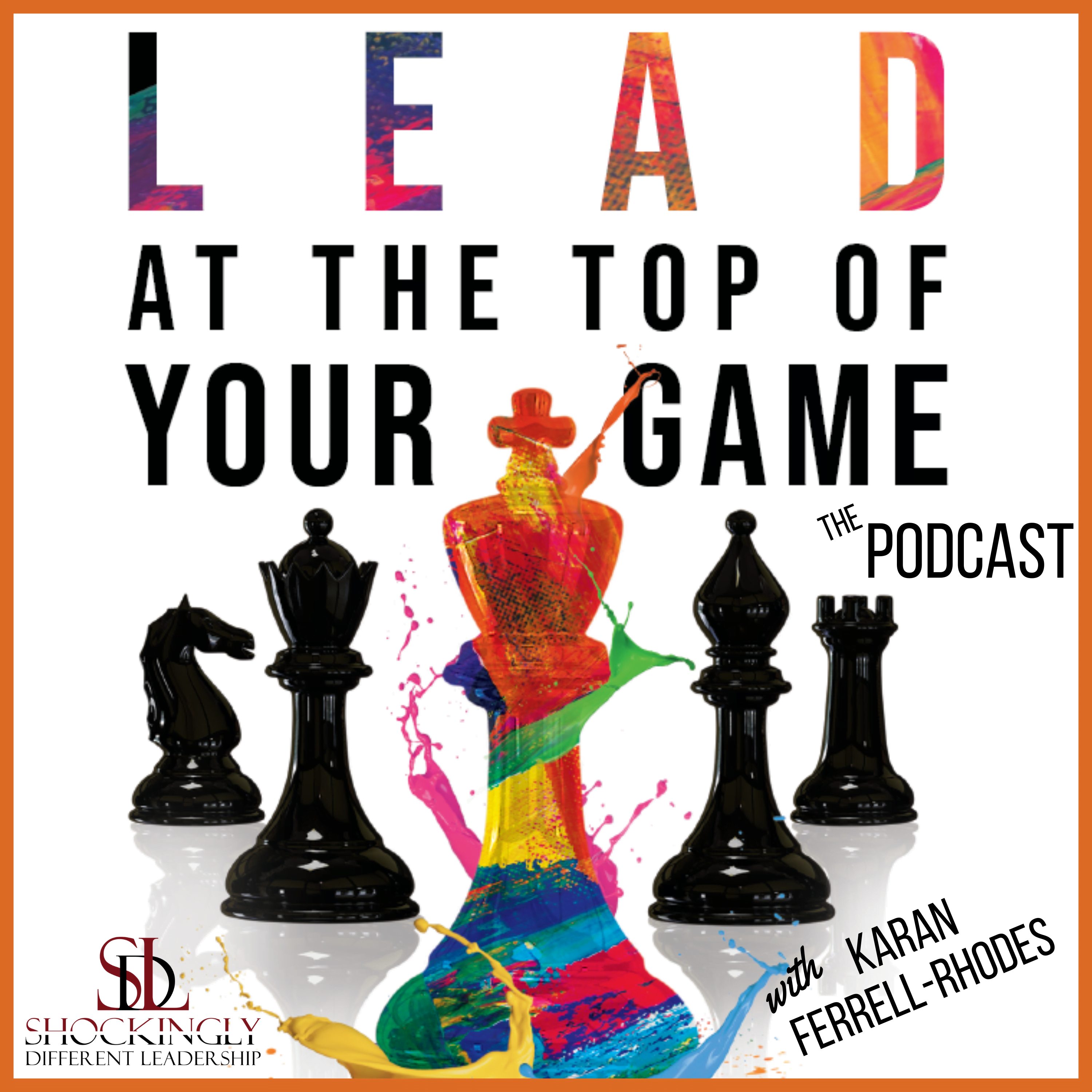
Posted by
SDL Media Team
Rather view our video podcast?

WHAT TO LISTEN FOR:
- What is Nerdio’s mission?
- How does Nerdio support remote work?
- What is the “Mayor Program” at Nerdio?
- How does Nerdio educate its customers and partners?
- What is the importance of recurring revenue?
- How does Nerdio stay updated with market trends?
“People like to cross the finish line.”
FEATURED TIMESTAMPS:
[02:29] Joseph’s Personal Interests
[04:21] Joseph’s Career Journey at Microsoft
[07:54] Nerdio’s Services and Market Reach
[11:32] Remote Work Culture and Challenges
[18:02] Signature Segment: Joseph’s entry into the LATTOYG Playbook: Nerdio’s Growth and Recognition
[20:32] Nerdio’s Future Plans and Customer Focus
[24:07] Signature Segment: Joseph’s LATTOYG Tactic of Choice: Leading with Drive for Result

ABOUT JOSEPH LANDES
Joseph Landes is the co-founder and chief revenue officer of Nerdio and a proven leader with a strong focus on driving large teams toward big, bold goals. One of his primary focuses at Nerdio is to scale Nerdio significantly for Azure products and enable MSPs to create and build successful cloud practices in Microsoft Azure.
LINKS FOR JOSEPH:
- Website: getnerdio.com/
- LinkedIn: linkedin.com/in/joseph-landes
- Email: jlandes@getnerdio.com
ADDITIONAL RESOURCES FOR YOU:


Episode Sponsor
SDL is the go-to firm companies trust when needing to:
- supplement their in-house HR teams with contract or interim HR experts
- implement leadership development programs that demonstrate an immediate ROI and impact on the business

Episode 129 | How Employee Connectedness Fuels Nerdio with Joseph Landes
Joseph Landes 00:03
When you have to operate in a country that’s not yours, you learn to adapt to things, you build up a certain amount of grit and resilience and things that may have traditionally seemed difficult for you to do, you know, maybe when you get back to the US, let’s say, just get a lot easier, and it gives you really a much wider perspective on the world and business and people and things like that.
Voiceover 00:03
Welcome to the “Lead at the Top of Your Game” podcast, where we equip you to more effectively lead your seat at any employer, business, or industry in which you choose to play. Each week, we help you sharpen your leadership acumen by cracking open the playbooks of dynamic leaders who are doing big things in their professional endeavors. And now, your host, leadership tactics, and organizational development expert, Karan Ferrell-Rhodes.
Karan Rhodes 00:36
Hello, my superstars. This is Karen, and welcome to another episode of the lead at the top of your game podcast. I am just over the moon today with today’s guest. Today’s guests we have is Joseph Landes. He is a the chief revenue officer and co founder of Nerdio. And Nerdio is a platform that helps simplify how businesses deploy and manage Microsoft Cloud technology such as Azure virtual desktop and Windows 365 now in pure transparency. As you all know, I worked for Microsoft almost 14 years. And you know, once a Microsofty, always a Microsofty. I love the joke, but we have a very active alumni network and keep in touch with all of as many people as possible. And Joseph is in Nerdio doing some fantastic things in the market. And I couldn’t wait to feature him, but I wanted to start off by congratulating him and Nerdio, as they have recently raised 500 million in the series C round of funding. So huge congratulations. And welcome to the podcast, Joseph.
Joseph Landes 01:42
Thank you, Karan. It’s great to be here. And like you said, it’s always great to speak to a fellow Microsoft alum. So good to meet you.
Karan Rhodes 01:48
Very nice to meet you as well. All right. Well, we have a lot I want to talk to you about, Joseph, but before we get started, we always love to learn just a tad bit about our guests. So for just as much as you feel comfortable, could you give us a sneak peek into your life outside of work?
Joseph Landes 02:04
Wow. So people ask me about that. Sometimes I have two big things that I work on outside of work, in addition to my family. One is, I’m trying to visit every country in the world. I’m up to 109 and ways to go. But you know, I like doing that because I think it allows me to be more of a citizen of the world and really appreciate sort of the diversity that exists in the world. And I’m also working on a very big Reading project. I’m trying to read every literary fiction book from the New York Times notable book list from 1947 to present each year they add another 50 or so books. It’s about 1.7 million pages, and I’m about 30% of the way done. So long way to go, but I enjoy doing that as well.
Karan Rhodes 02:49
Oh, wow. Okay, you put us all to shame, Joseph, let me just say I was doing good with traveling to 37 countries.
Joseph Landes 02:59
Good for you! That’s amazing. You gotta get to 37 before you get to 109, so.
Karan Rhodes 03:02
I know I gotta work on that, but that is absolutely amazing, and I love what you’re doing around the reading as well. Kind of that brings additional insights and perspectives. I’m sure he’ll do it. So a third of the way, that’s more than your average person. So kudos to you on that, and good luck. Oh, you might have to come back and tell us the story once you get the closer to 90% How about that?
Joseph Landes 03:26
It’s gonna be another it’s gonna be about another 24 years or so, according to chat GPT, but we’ll see.
Karan Rhodes 03:32
Love it.
Joseph Landes 03:34
If you’re still recording podcast, then I’ll come back.
Karan Rhodes 03:36
Okay? We’ll see about that one. Well, thank you so much for sharing, Joseph. And first of all, I’d love to start out by giving our listeners just a highlight of some of the milestones in your career, because you’ve had a very storied career, and we’d love to also get a few highlights and how you ended up CO founding Nerdio.
Joseph Landes 03:57
So Karan, I started at Microsoft as a summer intern, and that was the summer of 1994 I was in college in Boston, and I decided to take a summer internship. I really didn’t know much about technology. I sort of fell into it. And then after the internship, I was so enamored with Microsoft that I decided to come back. When they offered me a job full time, I started may 30, 1995 there were about 12,000 people at Microsoft, and I was part of the college hire program. Once a quarter, we went to Bill Gates his house for dinner. I thought that was kind of a cool thing. I was sort of the one that didn’t want to ask any questions, because I was, I was kind of concerned he would wonder why he hired me and why the company hired me. But I ended up spending a bunch of years in Redmond doing different products. Product management jobs and sales jobs, and then I had a bit of a pivot in my career where I decided to do my first abroad assignment in 2006 I guess it was I went out to Munich to lead the server business for Eastern Europe, and I got very excited about working. Operating and operating outside the US. I found it to be like, really quite interesting. And people in Redmond told me, Oh, you shouldn’t go out there, because you may never come back. You’re not gonna be able to find a job back in Redmond. But I ended up doing five different assignments outside the US for Microsoft. I spent time, like I said, in Germany, in Russia, in the Czech Republic, and then about three and a half years each in India and Brazil. And I found it to be, I would say, the most interesting jobs that I had at Microsoft. And I always say that I certainly gained professionally, but I probably gained personally, even more, because when you have to operate in a country that’s not yours. You learn to adapt to things you you build up a certain amount of grit and resilience and things that may have traditionally seemed difficult for you to do. You know, maybe when you get back to the US, let’s say, just get a lot easier, and it gives you really a much wider perspective on the world and business and people and things like that. So I’m super grateful for the time that I had at Microsoft. It really 23 years of Microsoft. That was more than half my life. By the time I left, I was introduced to my co founder, Vadim Vladimirski, in 2018 and Microsoft’s Partner Conference Microsoft Inspire. Vadim was building a super interesting automation technology in his managed service provider in Chicago. And when we met, I thought that we’d be able to take that technology and use it to benefit us at Microsoft, perhaps. And after about a month or so of chatting with Vadim, we ended up deciding to start a company together to start what became nerdio. I left Microsoft. It was certainly not an easy decision. I had three children that were getting ready to go to college pretty soon, and that’s a pretty big risk. My parents kept asking me, you know, do you know what you’re doing? Leaving Microsoft to go work for company and like that doesn’t really exist and isn’t really doing too much, but it proved to be one of the best decisions of my life, and the dean and I have enjoyed a great relationship at work and personally, and it’s been just sort of a period of seven years of incredible growth for me, incredible learning, and it’s been great to be able to build the business together with all of our employees.
Karan Rhodes 07:20
That is just amazing. I know I did do Nerdio justice. So can you share with our listeners just a little bit more about how Nerdio services their clients?
Joseph Landes 07:29
Yeah…So, you know, we like to say that our software helps empower the smallest business in the world up to the largest business in the world. And you know, ultimately, we are all about making the lives of IT professionals who are looking to leverage the Microsoft Cloud much easier, much simpler. And the technologies that we really focus on are desktop virtualization, so the ability to stream your desktop from the Microsoft Cloud, from Microsoft Azure. So we were involved with Microsoft very early on in the development of Azure, virtual desktop and Windows 365, as you mentioned earlier, and we continue to seek ways to make leveraging the Microsoft cloud just a lot easier and a lot more efficient for IT professionals around the world.
Karan Rhodes 08:16
And are there certain size of business that is more ideal for new video like, is it more enterprise level or mid cap? Well, I mean, what is your ideal client?
Joseph Landes 08:25
Yeah, that’s really, I think the uniqueness of Nerdio, our software serves the five person doctor’s office, and it serves the 100,000 user University and kind of everything in between. So I don’t know a lot of companies in the world that can honestly say that their software is able to scale across those different sizes of organizations, the types of verticals that we serve, the types of it, professionals that we serve. And that’s, I think, incredibly unique for our company.
Karan Rhodes 08:59
It is very unique because usually there’s a niche that companies go after.
Joseph Landes 09:05
We started with, sort of the smaller size organizations, and we sort of expanded up to the larger size organizations. A lot of times you see software companies, they might start with one, but they struggle to break into the other. Like maybe they’re really good at selling into the enterprise, but when it comes to selling into SMB, they struggle. But we’ve been fortunate that we’ve been able to develop great expertise regardless of the size organization, regardless of the geography, regardless of the vertical.
Karan Rhodes 09:36
Fascinating. So I’m just curious as of now, there’s always change in the workplace and marketplace and what have you. But what is one of the things that you all are focused on over the next six to 12 months, right now that you’re, you know, really focused on meeting market needs or having to deal with some of the complexities of your industry?
Joseph Landes 09:57
Well, I think our secret sauce. If you will, is helping people work from anywhere. And I think we took a decision early on that we were going to bet on Microsoft. Not a huge surprise in terms of me coming from Microsoft team really being deep in Microsoft technologies. So we’re always looking for ways to make the lives of the end users and really the IT professionals who take care of end users desktops easier, and we want people to have that flexibility. You know, people talk a lot about remote work. I think the way we characterize it is is more work anywhere. And I think that’s the way the workforce is going. Now we at nerdio, we’re a fully remote workforce. We don’t have an office, we have a mailing address, but we don’t have a formal office, let’s say, and we eat our own dog food. You know, we all use virtual desktops, and we’re all able to have that flexibility of being able to work from anywhere on any device. And I think every day that we come into work, we’re trying to make that kind of paradigm for IT professionals much easier.
Karan Rhodes 11:01
Were you always fully remote? And if so, are there any challenges of continuing to be fully remote right now?
Joseph Landes 11:08
Yeah, when we started the company, when Vadim and I started, we were actually housed in the MSP and the managed service provider that he owned. So we were sharing space, let’s say, with service provider. And then, coincidentally, our lease was coming up for renewal right around the time that COVID hit. COVID hit, this was in Chicago, Skokie, Illinois. We had a office, actually, where I grew up in Skokie, and where Vadim lives in Chicago. And we were contemplating, what were we going to do? Were we going to find a new space? Did we want to continue to be tethered to his former MSP COVID hit? Everyone had to move out. And our company, really, I would say, grew up and accelerated during the early years of COVID, when many people, when everyone had to work from anywhere on any device. So we decided to not renew our lease and not look for a new place, and kind of see what it was like operating and running a remote company, which is what we do today. Now, I think the biggest challenge for anyone working in or running a remote company are people are employed. You know, how do you remain connected to your employees? How do you remain connected to each other? There’s a lot of incredible goodness that happens when people get together and they spend time with each other. And I think there’s even certain functions in a company that arguably do a lot better when they are together. There are certain times of a person’s career when they benefit with other people. You could say that maybe a salesperson, an enterprise sales executive that manages a specific territory. Maybe they don’t need to be necessarily with people in an office, but perhaps, let’s say the marketing function does really well when they’re together and they’re collaborating. So I think, as a leader of Nerdio, making sure that we create opportunities and moments for our employees to be able to get together in person, to be able to connect with each other. Certainly we have our our our all hands that happen remotely, but I’ll tell you about one program that we created about a year ago. I called it the mayor program. So we started looking at, where do we have large concentrations of employees? One was Boston. We tend to have a lot of people in the sort of Greater New England Boston area. So we appointed a mayor of Boston. Caitlin’s our mayor, in addition to her regular responsibilities, is a fabulous Director of Communications in our company. She’s also the mayor of Boston, and one of her jobs is to get everyone together, not every day, but on somewhat of a regular basis. You know, maybe people once a month, maybe they work together in a WeWork. Maybe they go to a Boston Red Sox game. Maybe they do drinks after hours. And it’s all so that people from different divisions within nerdy are able to see each other and get together and share ideas and just kind of have fun with each other. And then that program, once people saw it, was successful in Boston. We have mayors now all over the country and all over the world, and I think it doesn’t replace being in an office, but it’s just a different way for people to connect with each other.
Karan Rhodes 14:19
Oh, I absolutely love that concept, and I’ll share with you probably half my career at Microsoft were in global roles. So my teams, my extended teams, were all over the world, and we didn’t have a mayor concept, but we do as much as we could when we got together, you know, to make sure that we make connections and being what we call at Microsoft, in the field, anything outside of the mothership of Redmond. You know, you make good use, you are able to be in person with the larger team. So I used to always go and make sure I had lunches and coffee just lined up with everybody I wanted to, you know, stay deeply connected to and it made a difference. Especially when you weren’t there day in and day out, physically,
Joseph Landes 15:03
It makes a huge difference. We launched a second program this year that we call Nerdio break room. The idea is to do sort of a break room where you are, right, because the break room is where people sort of get together and they say hello and they talk about things, kind of the old water cooler concept?
Karan Rhodes 15:18
Yeah!
Joseph Landes 15:18
So what we’ve done is we’ve said to our employees, if you take someone else out, let’s say for an ice cream, which is my favorite activity, an ice cream, a coffee, a lunch, or whatever it is, we’ll pay for it. But you have to take somebody out, maybe who you don’t know, or you’re trying to get to know a little bit better. So we launched that this year, and it’s kind of fun to see how people are taking advantage of the break rooms and posting pictures on LinkedIn and getting to know each other, which is another kind of fun concept.
Karan Rhodes 15:45
I think that’s awesome. Okay, so it’s, you know, that on top of other things, are probably why you all were Microsoft Partner of the Year in just four years. I know it had a lot to do with your work, but it probably also had quite a bit to do with your company culture as well, so
Joseph Landes 16:04
I’d like to think, though, yeah, we were finalists two years in a row, and then we broke through. So it gives me certainly tremendous pride, on behalf of all of our employees, that we were named Microsoft Partner of the Year in the Americas last year. And of course, coming from a role where I used to judge those awards, right, right to actually win it. I know how hard it is to win it. I know how many people apply. And I know our whole company was very excited when we got that incredible recognition for all of our employees.
Karan Rhodes 16:30
It truly was, and for my listeners out there. I mean, you may not know, you know, the whole Microsoft culture and what have you, but even being nominated to be a Microsoft Partner of the Year is absolutely huge. It continues to be. And so the fact that nerdio has had so many nominations, been finalists, and actually winning is just amazing. I can’t put a big enough word on it. So thank you. Well, Joseph, we always try to leave a few leadership nuggets for our listeners and insights. And so you had a long career in corporate and many different roles, but in a global enterprise level type of organization. And then, as you mentioned in your highlights, you co founded nerdio with the group, and I’m just curious about for you as a leader, what was that transition like from the enterprise level, infrastructure and support of an organization to, you know, really building a high growth company? I mean, how did you all you tackle it, personally and professionally, and were there any roadblocks along the way?
Joseph Landes 17:38
Yeah, this could be a whole sort of multi it’s hard, very hard. And I think I see now as a leader at nerdio, when you interview people, and you try to bring people into a much smaller company from a global company like Microsoft, it is a difficult transition. You know, I went from, as you say, the biggest software company in the world to starting a software company, and you go from a situation where you have everything you need to you have to build everything. And I think you know, what I learned early on is that the people you want to bring into the organization are people who are builders, people who have demonstrated a capability of building things, not just being part of a system, and that could be building something anywhere. It doesn’t have to be at a large software company. But that skill, that DNA, is very, very important in the early days, and even now that we’re seven years into the journey or so, having people who love to build things, who, again, who have that grit, that resilience, that ability to sort of dig in and do the work. You know, there’s unlike in a large company, where maybe you could look to the left and look to the right and see other people who can help you. A lot of the jobs in nerdio you have to do yourself, which means that sometimes you’re going to fail. You’re going to try things that are not going to work, and that’s perfectly okay. So it is a difficult transition at the beginning to know that the buck stops with you, as they say, you have to do the work. There’s no vendor, there’s no other person who’s going to help you out. But that’s also incredibly rewarding, and because you’re able to sort of see the results of the work that you put in pretty immediately. And then, of course, you want to build an organization of people who to some extent, are going to be like you as well, are going to do that as well. And you kind of make mistakes along the way. You know, nobody, I think, is 100% when it comes to hiring, but ultimately, you start to find the kind of person who you think would be successful at the company you’re building, and you sort of keep running as fast as you can.
Karan Rhodes 19:38
Yeah, that makes a ton of sense. So I’m not sure. I don’t want any intellectual property announcements that are crossing that line, but I’m just curious what you all are thinking about, how you continuously grow the business, because there’s so many that need your services. But as we always say, technology changes in a nanosecond, and you always have to stay. A breast and astute around that. So I’m just thinking, you know, what are some of nerdios top priorities in the next, you know, couple of months or so?
Joseph Landes 20:07
I think Karan, the way I would answer that is, at nerdio, we’re a very outside in company, so we really wake up every day, and we try to be the best listeners we can. We listen to our customers, we listen to our partners. We set up things like customer and partner advisory boards so that we’re always, hopefully, at the forefront of what our customers and our partners want, and then that’s what we built. And we have a backlog a couple years long, of features and ideas and things that customers have asked us to build for them. And I think the more you could be an outside in company, the more success you’re going to have. I always tell my team, if you’re not sure what to do, go talk to a bunch of customers, and they’ll tell you right away. That’s true. So you know, I think that we, of course, listen to our partners and customers. We listen to where our closest partner, Microsoft is going, and we try to discern where we can add value on top of Microsoft native technologies. But having that outside in culture that really permeates everything we do is really quite important, I think, really guides us in terms of the investments we make moving forward.
Karan Rhodes 21:16
That makes a ton of sense, and because I’ve been, I guess, out of the Microsoft Game for a few years now. I’m just curious, are customers still struggling with customization and implementation because their business models are changing by the nanosecond as well? And I’m just curious, what are some or if not, what are some of the top of mind things you’re seeing, or trends that you’re seeing from your customer and partners?
Joseph Landes 21:39
Well, I guess we’ve Karan always taken the perspective that the more we could help educate our customers and partners, better off will be when we started the company, we said, like, Let’s educate first and sell second. Because if you spend time going to IT professionals, and you sort of teach them, and you learn with them, and you share with them your knowledge, eventually the punchline will be, well, actually, we do have something that we could sell you that might make this a little bit easier. So I would say that when it comes to things like implementing our technology, or just implementing many different technologies, we always take that posture of helping it. Professionals succeed with knowledge, making sure we have great certification programs, things like training camps, where we invite IT professionals to come and learn with us free of charge, and I think that’s really helped us grow. And even in those types of sessions, again, being an outside in company, we learn a lot about where we could continue to improve our technology to help our customers and partners.
Karan Rhodes 22:42
I love that. Love that. Well, gosh, time is flying by, but we can’t let you get out of here, Joseph without asking you our signature question that we always ask our guests and for my new listeners out there, our firm actually did a lot of research on high potential leadership execution, and there were seven main buckets that came out of the research that people who are highly successful usually tap or focus on at one point or another. So we always love to ask our guests, although all seven are equally as important, which one really popped for you? And Joseph was so kind to share that I’m having a drive for results really kind of pop for him, which I understand a little bit more now, the understanding what nerdio does, and more about his background and what he prioritizes. But having a drive for results is all about being very persistent and tenacious and ensuring your end goals are achieved, even if you have to pivot along the way. So curious ones want to know, Joseph, why does having a drive for result really resonate with you?
Joseph Landes 23:43
Well, I’d say Karan for a couple of reasons. When I think of drive for results, I actually think back to some of Microsoft’s leadership principles that I’m sure you remember to me, drive for results and creating clarity go sort of hand in hand. I think, when you start a company and you don’t have all the resources that a much larger technology company has, you have to deliver results pretty quickly, or you’re not going to have a business exactly and sort of focusing the company on a set of metrics, or in our case, really one metric, which was recurring revenue, I think, brought a lot of clarity to people, and it really made the mission of What we were trying to do much more clear, particularly in the early days of nerdio. I think people, when they come to work, they want clarity on what their job is, on what’s expected of them, but they also want clarity on where the company is going. And if you could set out really a North Star, which is, you know, here’s where we are today, here’s where we’re going, and these are the results that we need to achieve as a team, and these are the results that we need you to achieve in your role. I think it makes it a lot easier for people to come into work every day and really, quite frankly, get excited about what that mission is. You know, people like to cross the finish line. People like to accomplish whatever it is. You know, people like checking. Things off of a list and say, you know, at the end of the day, you know, I put in a day’s work, and I’ve really accomplished this. So I think it’s hard for me to think beyond drive for results. Of course, all the other leadership principles have their own positive nature to them, and things that are important for sure, the list that you shared with me, I’m sure, resonate in different ways with different people, yeah, but I think especially in the early days of running a company, being sort of singularly focused on results is very important.
Karan Rhodes 25:27
I totally agree, absolutely. That’s what we get rewarded for, right? That’s what it’s in advise for, and that’s how you continuously grow businesses and service customers who need the goods and services that you offer. So it is so important. So Joseph, before we let you go, we’d love to ask you, what is maybe one last piece of advice or nugget that you have for our listeners on to think about as they try to leave it lead at the top of their games, is there one thing that you would encourage them to do or focus on?
Joseph Landes 25:59
I think a lot of times people will tell you, in life why something can’t be done. My co founder, Vadim, is really good at talking about that, and really is quite I would say inspirational. Was inspirational to me in thinking about this, a lot of times when someone says something can’t get done, or I can’t do this, it’s in your head, and you have to sort of break it down. I think the phrase that Vadim uses is, what are the constraints? So if someone says, I can’t do this, so let’s start breaking it down. What are the things that are stopping you from being able to do that? And a lot of times you find it is in your head. It’s just you think it can’t get done, but beyond your reach is really within your grasp. And I think when you look at that challenge in front of you, you know, you know it actually could get done. You just got to kind of figure out how to get it done. And that’s something that I think we think about all the time at nerdio, and I think it’s how you are able to achieve amazing things. Is when you have that belief that you can get it done.
Karan Rhodes 26:50
Love that awesome. Well, thank you so much, Joseph for these insights. We’re definitely going to have your bio links and all kinds of information in our show notes about this episode, but always love to give the guests some air times as well to know where to find you. So if people are interested in following up with you and Nerdio, where can they find you?
Joseph Landes 27:12
Yeah, for sure. So I’m very active on LinkedIn. Just look me up. Joseph Landes, I always give people my email address. JLandes@get nerdio.com Happy to answer any questions and get to know you. Our website is get nerdio.com and we’d love to see you there as well. So please reach out
Karan Rhodes 27:30
Absolutely well. Thanks again, Joseph for this wonderful episode, the fantastic insights you’ve had, and we truly appreciate the gift of your time today,
Joseph Landes 27:40
My pleasure. Thanks for having me. Karan.
Karan Rhodes 27:42
Awesome. And thank you to listeners for the gift of your time as well. We know that you have millions of other podcasts you could be listening to, and we do not take your patronage slightly. All that we ask is that you like and subscribe on your favorite podcast platform or choice and share our podcast with just one friend, because by doing so, it’ll help us all to better with the top of our game. Thanks so much. And see you next week. And that’s our show for today. Thank you for listening to the lead at the top of your game podcast, where we help you lead your seat at any employer, business, or industry in which you choose to play. You can check out the show notes, additional episodes, and bonus resources, and also submit guest recommendations on our website at leadyourgamepodcast.com. You can follow me on Twitter, Facebook, Instagram, and LinkedIn by searching for the name Karan Rhodes with Karan being spelled K a r a n. And if you like the show, the greatest gift you can give would be to subscribe and leave a rating on your podcast platform of choice. This podcast has been a production of Shockingly Different Leadership, a global consultancy which helps organizations execute their people, talent development, and organizational effectiveness initiatives on an on-demand, project, or contract basis. Huge thanks to our production and editing team for a job well done. Goodbye for now.

Want to be a Podcast Guest?
Check out our guest qualifications and submit our brief form to be considered.
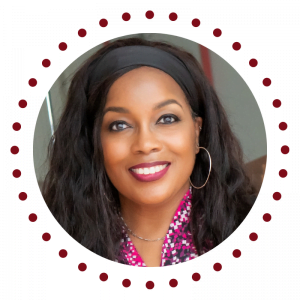
Want Karan to be Your Podcast Guest?
- Blended Workforces & the Gig Economy
- Critical Execution Tactics of High-performing Leaders
- Entrepreneurism & Leading Your Business
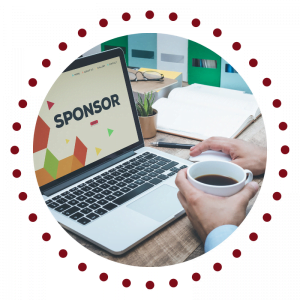
Want to be a Podcast Sponsor?
All sponsorships come with a featured spot on show notes pages.
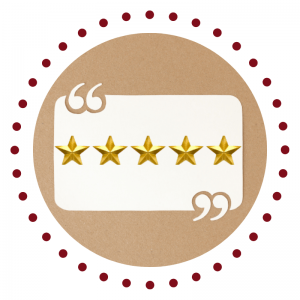
Like the Show? Please Leave a Review
If you like the show, it would mean the world to her if you left a quick review.
Your word is golden, so a HUGE thank you in advance!

#KeepInTouch
via our podcast alerts
Subscribe now to discover why thousands of monthly listeners who are passionate about doing their best work prioritize time each week to listen to the Blended Workforces @Work podcast.
#AboutSDL
#WhereToFindUs
MAILING
4480-H South Cobb Drive
PMB 219
Smyrna, GA 30080
PHYSICAL
2121 NewMarket Parkway
Ste. 108
Marietta, GA 30067
#ContactOptions
Customer Service Email:
service@shockinglydifferent.com
Call or Text:
770-384-1103
#Office Hours
MON-FRI
8:30 AM – 6:30 PM
Weekends By Appointment

